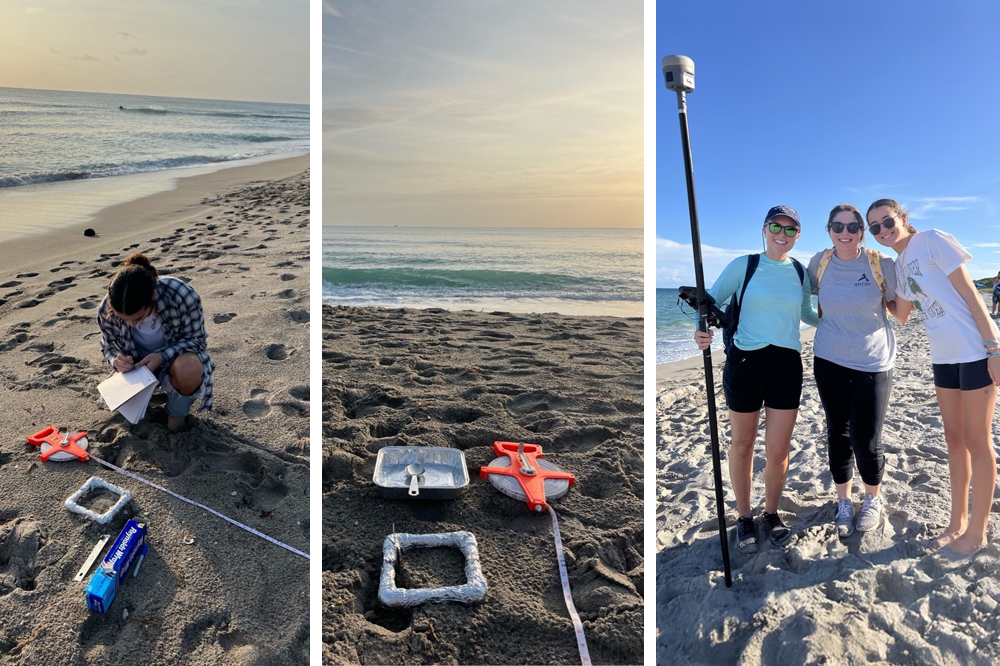By Amy Butler, Florida Atlantic University
In recent years, plastic bottles and floating garbage have unfortunately become a common site along many shorelines. But the plastics that are not visible to the naked eye, called microplastics, are quickly becoming a cause for concern among environmental experts.
To date, researchers estimate that approximately 170 trillion plastic particles, mostly microplastics, are floating in the world’s oceans. Staggeringly, some studies suggest that amount will double in the next 15 years, and it is estimated that by 2050, there could be more plastic in the ocean than fish.
Microplastics are plastics with sizes less than 5 mm in length, which are formed from the breakdown of larger plastics or were produced for commercial use. While microplastics are rapidly permeating our oceans, they have also been found in water, soil, sediments and even in animals and humans. To further complicate the issue, the ingestion of microplastics has been linked to problems in reproduction, development and survival.
“Given the high population density here in South Florida and the importance of our coasts for habitat, tourism, and the economy, understanding the distribution of microplastics is critical to the health and sustainability of communities and the environment,” stated Tiffany Roberts Briggs, Ph.D., chair and associate professor in the Department of Geosciences, Charles E. Schmidt College of Science.

Roberts Briggs’ research broadly focuses on microplastics in coastal sediments. She is working to evaluate microplastics by type, abundance and distribution in beach and mangrove sediments in South Florida and comparing it with the sediment properties where the microplastics are found. In addition, Roberts Briggs is determining whether there is seasonal variability of microplastics in beach sediments.
Schmidt College of Science graduate students, Halaina Hahn ’22, and Kayla O’Brien ’23, are part of her dynamic microplastics research team. Hahn, a master’s degree student, is quantifying the abundance of microplastics within South Florida’s beaches.
“Understanding the abundance of microplastics is a very important step toward mitigation efforts,” said Hahn. “There is limited research regarding microplastics in coastal sediments and even less in southeast Florida. This research will help inform conservation and management initiatives that can be established to protect these vital coastal environments.”
As a Ph.D. student, O’Brien is studying storm-induced microplastic distribution on Florida’s barrier islands, as well as the origin, transport mechanisms and implications for their residency time within South Florida’s coastal environments. Her research builds upon her master’s degree project which focused on microplastics in mangrove and beach sediments on the barrier islands.
“When it comes to the world of microplastics, there are still so many unknowns,” said O’Brien. “The role of storm-induced transport and the relationship between sediment and microplastics is not fully understood. Gaining a better understanding on the current microplastics conditions across Florida’s barrier islands — which are vulnerable and important coastal ecosystems — is imperative for conserving and managing the health of these crucial coastal systems.”
Outside of the lab, both graduate students aim to make a direct impact in the community. Hahn serves as president of Florida Atlantic’s chapter of the American Shore & Beach Preservation Association (ASBPA) Students and New Professionals. She is also an intern at Palm Beach County Environmental Resource Management, where she deploys environmental monitoring techniques to enhance habitat restoration. On a national level, O’Brien has been frequently invited to share her knowledge as a guest speaker, lecturer and presenter at key conferences and events.
“Every time I share my research, I have the chance to make an impact on the individuals who are listening. After several presentations, I have had people tell me they had never heard of microplastics before,” noted O’Brien. “I think this awareness is vital for addressing our plastic pollution problem. Plastics are a part of all our lives, but making sustainable choices starts at home on an individual level.”
Together, the team hopes that their research will help coastal conservation efforts, inform management strategies for preserving and improving the health of coastal systems, and elucidate the public about the hazards of microplastic pollution.
“We hope the microplastics research being conducted across the college can help the community, and in particular the next generation, to connect plastic use and misuse to the dangers of microplastics in our sediments, in our waters, and the potential for it to end up in animals and our own bodies,” shared Roberts Briggs.
This piece was originally published at https://www.fau.edu/science/news/marine-microplastic-pollution/. Banner photo: An aerial view of the beach (FAU photo).



